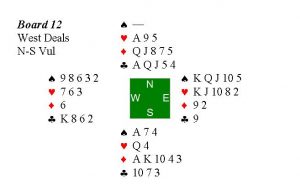

1 Announced by South as better minor.
2 (a) Alerted by West
(b) Meaning queried by South (since it could be CRO, Michaels or natural)
(c) West said the bid was natural
(d) South asked “Clubs?”
(e) West nodded.
3 North reasoned that having been advised by West that East held clubs, it is reasonable to conclude that this must include the King, since North held three of the top four honours. She further reasoned that a club finesse would therefore fail. For this reason she signed off in 5♦. If North had known that in reality East held both majors, then given her void in spades plus A♥, cover in clubs, and a partnership holding in diamonds then she would obviously have bid 6♦
On returning home that night we saw that 7/8 pairs had made 12 or 13 tricks in diamonds, including ourselves, and 3/8 did bid a slam. Clearly a slam was there for the taking and if North had not been misled by misinformation from West, then North would have bid it for the reasons stated above.
However the Director ruled in favour of E/W and imposed no penaltyon them at all despite the fact that N/S were severely damaged by the misinformation give. Indeed, the Director defended the misinformation by saying”…West had just been confused…”
We were playing NS in both cases. I would be very grateful if you would give me your opinions as to whether I have a chance of winning an appeal.
Mike Ingle – Oswetry.
When a player incorrectly answers a question as to what his partner’s bid means, it’s important that the Director determines what their actual partnership agreement is, usually by reference to their system card. I assume this East/West pair didn’t have a card.
Firstly the Director should consider any possible use of Unauthorised Information from the offending pair. In this case there is clearly none.
Next step is for the Director to determine whether the respondent to the question is merely guessing what the system is. Rather than guess, it’s better for a player to own up and say ‘haven’t a clue’ or whatever. In this case by saying (nodding) that the 2♣ bid is natural means that West is sure that this is their system (this can usually be determined from the way in which the question is answered). From the facts that you give, I would assume that West didn’t actually know the system. I don’t believe that 2♣ can ever be natural over opponent’s better minor – (which implies a three-card suit).
So at this juncture I think it reasonable to assume that NS have been given mis-information (note I haven’t said deliberately).
The next step is to determine whether North/South have been damaged by the information. This is best assessed by asking the question ‘what would they have bid given the correct information’. So if North/South (particulary North) were told ‘both majors’, together with whether weak, intermediate, or strong, what would the likely bidding be. North seems to be the sort of player who can make logical probable deductions from opponent’s bidding, so I think he would have a very strong case in going for the diamond slam (partner has probably 5-card diamonds; it’s more likely ♣K onside – particularly if the two suited bid may be weak as seems to be the case).
Just one fleeting observation – the Director has to convince himslf that a player is not attempting a ‘double shot’, i.e. deliberatedly making a dubious bid knowing that if it were to go wrong, he could fall back on a favourable ruling from the Director. I do not think this is the case here.
The next think a Director has to ask himself is, is he absolutely sure that the slam would be reached. Here’s where the subjectivity comes in. It’s rare that a Director is 100% sure of the outcome, so in most cases he would award a ‘weighted score’. The mathematics of this are not easy to calculate but all scoring software enables the input of the data to arrive at a weighted score. He should consider all probable results and attach a percentage to them. In this case, assuming the slam is bid, there are 12 or 13 tricks available (the K8♣ could be key cards in preventing 13 tricks from an inferior declarer). So subjectively I would give weighted scores of 5% 5♦ making 12 tricks; 15% 5♦ making 13 tricks; 35% 6♦ making 12 tricks; 45% 6♦ making 13 tricks (note that if it went to appeal, an appeals committe would not overrule the actual weightings unless they were grossly wrong).
The outcome of this weighting should then be compared with the table result, and the non-offending pair is then given the better of these two. In this case the weighted score would clearly be better.
You are asking for an opinion – I personally think you would have no problem in winning an appeal if you’ve given me all the correct facts (I don’t mind you quoting me, as responding to a request for a ruling). Just be careful that you have submitted your possible intention to appeal within the allowable time. The appeal would certainly not be classed a frivolous (the technical terminology is ‘without merit’), so I don’t think there would be any danger of you losing your deposit with any competent appeals committee.
Tony